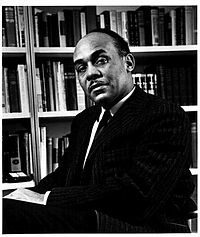Ralph Ellison
From Wikipedia, the free encyclopedia
 | |
| Born: | March 1, 1914 Oklahoma City, Oklahoma, USA |
|---|---|
| Died: | April 16, 1994 New York, New York, USA |
| Occupation(s): | Writer |
| Magnum opus: | Invisible Man |
Ralph Ellison (March 1, 1913[1] – April 16, 1994) was a scholar and writer. He was born Ralph Waldo Ellison in Oklahoma City, Oklahoma, named by his father after Ralph Waldo Emerson. Ellison was best known for his novel Invisible Man (ISBN 0-679-60139-2), which won the National Book Award in 1953. He also wrote Shadow and Act (1964), a collection of political, social and critical essays, and Going to the Territory (1986). Research by Lawrence Jackson, Ellison's biographer, has established that he was born a year earlier than had been previously thought.
Contents[hide] |
Biography
In 1933 Ellison entered the Tuskegee Institute on a scholarship to study music. He had hopes of writing a symphony. Due to financial difficulties, Ellison was forced to leave Tuskegee after three years. In 1936 Ellison moved to New York City where he met Richard Wright. After writing a book review for Wright, Wright encouraged Ellison to pursue a career in writing, specifically fiction. The first published story written by Ellison was a short story entitled "Hymie's Bull," a story inspired by Ellison's hoboing on a train with his uncle to get to Tuskegee. From 1937 to 1944 Ellison had over twenty book reviews as well as short stories and articles published in magazines such as New Challenge and New Masses. During WWII Ellison joined the Merchant Marine, and in 1946 he married his second wife, the former Fanny McConnell. She supported her husband financially while he wrote Invisible Man, and typed Ellison's longhand text. She also assisted her husband in editing the typescript as it progressed.
Invisible Man explores the theme of man’s search for his identity and place in society, as seen from the perspective of an unnamed black man in the New York City of the 1940’s. In contrast to his contemporaries such as Richard Wright and James Baldwin, Ellison created characters who are dispassionate, educated, articulate and self-aware. Through the protagonist, Ellison explores the contrasts between the Northern and Southern varieties of racism and their alienating effect. The narrator is "invisible" in a figurative sense, in that "people refuse to see" him, and also experiences a kind of dissociation. The groundbreaking novel, with its treatment of previously taboo issues such as incest and white America's distorted perceptions of black sexuality, won the National Book Award in 1953. Ellison has also been awarded the Langston Hughes Medal, the Presidential Medal of Freedom, the Rosenwald Grant, the Russwurm Award and the Chevalier de l’Ordre des Artes et Lettres. Ellison was also a charter member of the Fellowship of Southern Writers.
Ellison was also an accomplished sculptor, musician and photographer and college professor. He taught at Bard College, Rutgers, the University of Chicago, and New York University.
Ralph Ellison died of pancreatic cancer on April 16, 1994, and was buried in the Washington Heights neighborhood of New York City. His wife, who survived him, lived until November 19, 2005.
Five years after his death, under the editorship of John Callahan, a professor at Lewis & Clark College and Ellison's literary executor, Ellison's second novel, Juneteenth (ISBN 0-394-46457-5), was published. It was a 368-page condensation of over 2000 pages written by Ellison over a period of forty years. Ellison never actually completed this book, though, because his earlier drafts of it were lost when his house burned down and he had to start over.
Works
- Trading Twelves: The Selected Letters of Ralph Ellison and Albert Murray (with Albert Murray) (ISBN 0-375-50367-6)
- Living with Music: Ralph Ellison's Jazz Writings (ISBN 0-679-64034-7)
- The Collected Essays of Ralph Ellison (1995) (ISBN 0-679-60176-7)
- Going to the Territory (ISBN 0-679-76001-6)
- Flying Home: and Other Stories (1996)
- Invisible Man (1952)
- Shadow and Act (1964) (ISBN 0-679-76000-8)
- Juneteenth (1999) published posthumously
- On Being the Target of Discrimination (1989) (appeared in a New York Times Magazine supplement called "A World of Difference")


0 Comments:
Post a Comment
<< Home